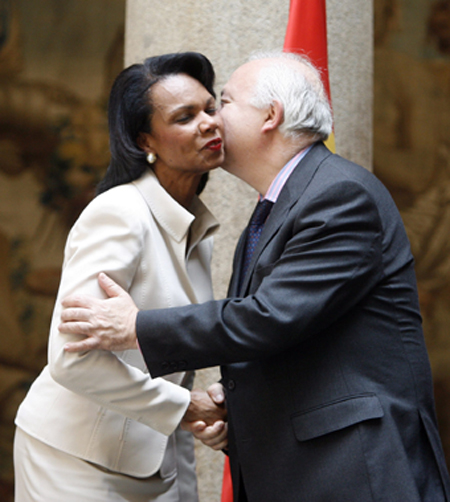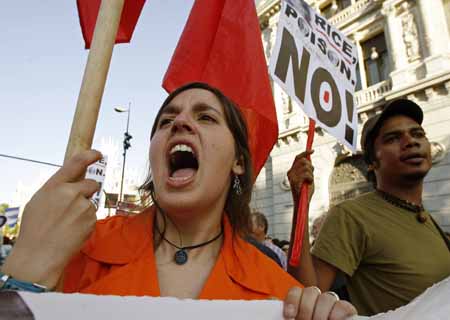Americas
Rice: US not preparing for war vs Iran
(AP)
Updated: 2007-06-02 13:33
 |
Large Medium Small |
The US is not preparing for war against Iran and US Vice President Dick Cheney supports that policy, US Secretary of State Condoleezza Rice says, taking a swipe at a U.N. official who says he's worried about "crazies" who want to start bombing.
"The president of the United States has made very clear what our policy is. That policy is supported by all the members of his Cabinet and by the vice president of the United States," Rice said Friday.
Rice, in Spain at the close of a European visit, was asked about the comments of the chief of the U.N. nuclear watchdog agency. Mohamed ElBaradei was quoted by the BBC as warning against the views of "new crazies who say 'let's go and bomb Iran.'"
Cheney is frequently the administration's most hawkish voice on Iran, but Rice said she did not know to whom ElBaradei referred. The United States does not rule out military action but says there is no plan or intention to attack Tehran.
Cheney has not publicly advocated an assault on Iran, but he used the deck of an aircraft carrier in the Persian Gulf last month to warn Tehran that Washington would prevent the Islamic republic from dominating the Middle East.
Also stepping up pressure on Iran was President Bush, who demanded Friday that Iran "immediately and unconditionally" release four Iranian-Americans detained for alleged espionage and provide information about a former FBI agent missing in the country.
"I strongly condemn their detention at the hands of Iranian authorities," the president said in a written statement.
Rice said the United States is using diplomacy to avoid "getting to a place where we have an unpalatable choice." She described that as a choice "between having to do something on the military side or allowing Iran to have a nuclear weapon. That's a choice that people talk about."
Rice, who has tangled with ElBaradei before, suggested he is giving Iran mixed signals.
"We have a diplomatic choice, but it's only going to succeed if we are absolutely clear with the Iranians — not muddying the message in any way," she said.
Iran is getting the right message from the U.N. Security Council, which has ordered two rounds of sanctions over Iran's nuclear program, and from the world at large, Rice said.
"I expect them to hear it loud and clear from the IAEA, and from its director," she said.
Separately, in what could be an attempt to delay the threat of new U.N. sanctions, Iran has pledged to cooperate with the nuclear monitoring agency probing its atomic program, according to an official speaking to The Associated Press.
That would end years of stonewalling by Iran and help the IAEA establish whether Tehran's past nuclear efforts were exclusively peaceful in nature.
At the White House, National Security Adviser Stephen Hadley said Iran's defiance of U.N. mandates raises the prospect of a third U.N. resolution to increase pressure to suspend nuclear enrichment work.
While the U.S. continues its tough stance on Iran's nuclear program, Hadley said the United States agreed to talk to Iran about Iraq because the Iraqi government requested the meeting and because Iran's activities in Iraq are "killing our kids — our men and women in uniform over there."
U.S. and Iranian ambassadors held talks in Baghdad on Monday, the first formal ones between the two nations in nearly three decades. The two sides were to meet again in less than a month, but on Friday, Iran's foreign minister said, during a visit to Syria, they would continue "if the American side is willing to change its policies and is prepared to accept the realities in Iraq." He did not elaborate.
Rice's visit to Madrid was not connected to nuclear talks there Thursday between negotiators for Iran and the European Union. The talks ended without announcement of any breakthrough.
Rice is the highest-ranking U.S. official to visit Spain since a formerly close alliance turned frosty following the election of a Socialist government three years ago.
After hard feelings in Washington over Spain's quick pullout from Iraq and a dispute last year over Spanish plans to sell military equipment to Washington antagonist Huge Chavez of Venezuela, a fresh disagreement has threatened to wash away any growing good will.
At issue is Spanish Foreign Minister Miguel Angel Moratinos' decision to snub Cuban dissidents on a visit to Havana in April. Moratinos has defended the move, saying engagement with Cuba is the best policy.
When Moratinos predicted that in time Rice would see the value of his approach, Rice, listening to his remarks by translation on a headset, looked amused and unconvinced. As Moratinos continued to speak, she looked at the crowd of reporters and silently mouthed what appeared to be the phrase, "Don't hold your breath."
| 分享按钮 |


